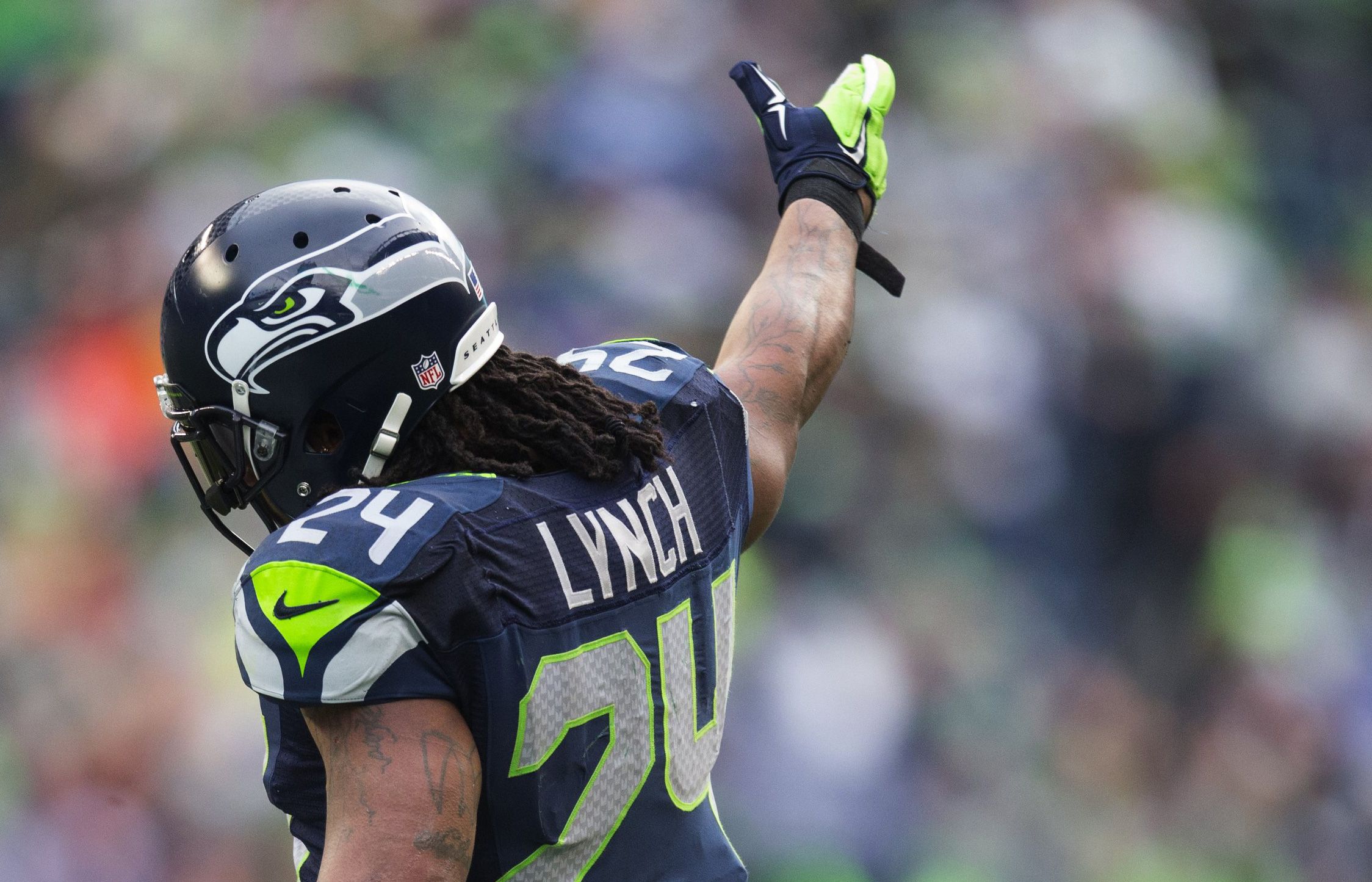Seattle Seahawks running back Marshawn Lynch announced his retirement with a wordless Tweet Sunday during the fourth quarter of the Super Bowl. The team later sent its own confirmation that Lynch has indeed hung up his cleats for good.
Marshawn Lynch’s run as an NFL player, including six seasons with the Seahawks, is apparently over.
It ended in perhaps the most fitting fashion possible for a player known as much for his reluctance to the talk to the media as the punishment he dealt to defenders — with a wordless tweet.
Related video: Marshawn Lynch: "I'm here so I don't get fined."
Marshawn Lynch repetitively responded to questions at the 2015 Super Bowl Media Day with the same answer: "I'm here so I don't get fined." Watch more video from Lynch's Seahawks career. (Danny Gawlowski / The Seattle Times)During the fourth quarter of the Super Bowl on Sunday night, Lynch tweeted a photo of cleats dangling over a wire and a “peace out’’ emoji, signifying he was hanging them up after nine years in the NFL, including the past six with the Seahawks.
Lynch’s tweet was followed a few minutes later by a tweet from Seahawks cornerback Richard Sherman offering further confirmation: “Salute to my guy @MoneyLynch … It was an honor sharing the field with you.”
Lynch’s mother, Delisa, also tweeted: “When one door closes God opens another one even better thank you Jesus!!!!!”
Quarterback Russell Wilson also Tweeted Sunday night about Lynch writing “Honor playing with one of the best running backs of all time! Going to miss sharing the backfield with you 24…”
The Seahawks did not officially announce Lynch’s retirement. But on Sunday night they re-tweeted Lynch’s tweet with the hashtag “#ThankYouBeastMode.” And late Sunday night, in what constituted the clearest on-the-record confirmation of Lynch’s intentions, team owner Paul Allen tweeted: “Thank you @MoneyLynch for a great career as a Seahawk. So many memorable runs and quakes! #BeastMode !”
League sources confirmed that Lynch plans to retire and that the tweets simply were the way he wanted to let the world know.
But while Lynch’s run with the Seahawks is over, the runs he made with them as the heart-and-soul of the offense during the franchise’s most successful era figure to live on for as long as the team exists.
He is a five-time Pro Bowl and one-time All-Pro selection, and was the offensive leader during the Seahawks’ Super Bowl-winning 2013 season.
Lynch finishes his Seahawks career as their fourth-leading rusher with 6,347 yards, second in rushing touchdowns with 57 (trailing the 100 by Shaun Alexander) and third in total touchdowns with 65 (behind the 112 by Alexander and 101 by Steve Largent).
Lynch, who turns 30 in April, endured the most injury-riddled season of his career in 2015. He was limited to seven regular-season games and one in the postseason, due largely to an abdominal injury that required surgery. He finished with a career-low 417 yards in the regular season. After missing the last seven regular season games and the wild-card playoff win at Minnesota, Lynch returned for a divisional playoff game game at Carolina. He rushed for 20 yards on six carries in a 31-24 loss. His final carry was an eight-yard gain with 7:25 to play in the fourth quarter.
He had considered retiring after each of the previous two seasons as well, and general manager John Schneider said during two radio interviews Jan. 22 that Lynch was “leaning’’ toward retiring again this year, a statement proven true with the events of Sunday.
The Seahawks will save $6.5 million against the salary cap with Lynch retiring (the same total that would have been saved had he been released, which the team was expected to likely do if Lynch had wanted to keep playing). The Seahawks could ask for $5 million in bonus money back — $2.5 million pro-rated for each of the two remaining years on his contract — but it is not expected that they will do so. It is unclear if Lynch has filed official retirement papers, but several people close to the situation Sunday confirmed that Lynch isn’t expected to play again.
In fact, it was expected that the Seahawks would release Lynch if he indicated he wanted to keep playing. The team now has a cheaper, younger and proven alternative at tailback in Thomas Rawls, who rushed for 830 yards this season as a rookie before suffering a broken ankle against Baltimore (he is expected to recover fully). It is also expected that the team will re-sign Christine Michael, who rushed for 70 yards in the playoff win at Minnesota after coming back to the team in December.
As much as the numbers, Lynch’s Seahawks career will be remembered for the moments.
There was the Beast Quake run, an improbable 67-yard run to clinch a playoff win against New Orleans in 2011 in which he broke eight tackles, bringing CenturyLink Field to such a roar that Pacific Northwest Seismic Network’s monitoring stations detected tremors near the stadium.
There was Beast Quake 2, a 79-yard touchdown at Arizona late in the 2014 season that keyed a late-season rally that helped propel the Seahawks to a second straight Super Bowl.
There was the 24-yard touchdown with 1:25 left that capped a 15-0 run in 44 seconds that helped the Seahawks come back against Green Bay in the NFC Championship Game. That run was part of a Seahawks playoff-high 157 yards rushing, one of six times Lynch rushed for more than 100 yards in the postseason, third-most in NFL history.
But Lynch was about more than the big runs. Beast Mode came to signify a way of life unique to Seattle, and his love of Skittles spiked a local popularity in the candy. And though he had little to say to the media, what he did say — “I’m just here so I don’t get fined’’ — tended to be memorable, as did his commercials.
Few could have imagined Lynch would become one of Seattle’s most memorable sports figures when the Seahawks traded a 2011 fourth-round pick and a 2012 fifth-rounder to Buffalo for him.
He moved into the starting lineup one week after arriving. After helping the Seahawks clinch an improbable NFC West title at 7-9 in his first season, he took his first step toward becoming a Seattle folk hero with his run against the Saints.
Lynch got off to a sluggish start in his second season in 2011, as he was held to fewer than 100 yards in his first six games and missed another because of back spasms.
But a 135-yard performance in a game at Dallas on Nov. 6, 2011 is often regarded as a turning point for the Seahawks in the Pete Carroll era, as the offense shifted to more of a ground-based attack with Lynch as its leader. He finished the year rushing for more than 100 yards in six of the last nine games as the Seahawks set their template for success.
He had his best year in 2012 with 1,590 yards and 5.0 yards per carry as the Seahawks won their last five games to finish 11-5 and advance to the divisional round of the playoffs.
Even as Russell Wilson proved himself at quarterback and the defense became the best in the NFL, Lynch continued to serve as a driving force as the Seahawks won their first Super Bowl in 2013. He rushed for 1,257 yards and 12 touchdowns in the regular season and rushed for 140 and 109 in playoff wins over the Saints and 49ers. He scored the team’s first touchdown in a 43-8 Super Bowl win over Denver.
Rumblings that Lynch was considering retiring bloomed almost immediately after that win, and he held out the first eight days of training camp in 2014 before an adjustment in his contract brought him back in.
He had another stellar season in 2014 with 1,306 yards and 13 touchdowns as the Seahawks returned to the Super Bowl against the New England Patriots. Lynch almost got Seattle a coveted second straight Super Bowl title, tackled at the 1-yard-line on a first-down run with time running down and the Seahawks trailing the Patriots 28-24. Then quarterback Russell Wilson threw one of the most shocking interceptions in NFL history and the season ended in frustrating fashion with Lynch the focal point of a play call that will be debated forever.
Rumblings again began that Lynch might hang it up, but he then signed a three-year extension with the team that paid him $12 million in 2015. Still, many around the team considered 2015 as likely his final season. That speculation only grew as Lynch battled an assortment of injuries early in the season, including a hamstring injury that held him out of games against Detroit and Cincinnati. Then came the sports hernia surgery and a strange sequence of events when the team indicated Lynch would play in the wild-card game against the Vikings before he decided he wasn’t ready and didn’t make the trip for an eventual 10-9 win.
He returned for one last game against Carolina, after which speculation immediately rose that Lynch may have played his last game.
And in his own unique fashion, surprising only to those who hadn’t paid attention to the rest of his career, Lynch made his decision known Sunday night bringing an end to a Seattle sports career unlike any other.
Marshawn Lynch bio
Full name: Marshawn Terrell Lynch.
Nickname: Beast Mode.
Born: April 22, 1986 in Oakland.
Height, weight: 5-11, 215.
Position: Running back.
College: California.
Drafted: Selected by the Buffalo Bills with the 12th overall pick in the 2007 NFL draft.
How acquired by Seahawks: Traded by Buffalo to Seattle for a 2011 fourth-round draft choice and an undisclosed 2012 choice on Oct. 5, 2010.
Notable: Five-time Pro Bowl and one-time All-Pro selection. … Has rushed for 9,112 yards and 74 touchdowns in his NFL career. … His 59 total touchdowns (NFL-leading 51 rushing, eight receiving) lead the NFL since 2011, and he set his career high in the 2014 season with 17 total touchdowns (career-high 13 rush, career-high four receiving). … Was the only NFL player to rush for more than 1,000 yards and score 10 rushing touchdowns from 2011-14. … Set career highs in carries (315, fifth in NFL), yards (1,590, third), average gain (5.0, fourth) and most yards from scrimmage (1,786, fourth) in 2012. … Became the third player (Chris Warren, Shaun Alexander) in Seahawks history to rush for more than 1,500 yards in 2012. … Career-long 79-yard touchdown run at Arizona (12/21/14) ranks as the fourth-longest in Seahawks history.
Most NFL rushing yards since 2011
Player, yards
LeSean McCoy, 5,970
Adrian Peterson, 5,893
Marshawn Lynch, 5,774
Frank Gore, 5,626
Matt Forte, 5,366
Most NFL 100-yard games since 2011
TDs, player
25, Marshawn Lynch
25, Adrian Peterson
23, Arian Foster
23, LeSean McCoy
20, DeMarco Murray
Seahawks’ career leaders
Rushing attempts
- Shaun Alexander (2000-07), 2,176
- Curt Warner (1983-89), 1,649
- Chris Warren (1990-97), 1,559
- Marshawn Lynch (2010-15), 1,457
- John L. Williams (1986-93), 1,148
Rushing yards
- Shaun Alexander (2000-07), 9,429
- Chris Warren (1990-97), 6,706
- Curt Warner (1983-89), 6,705
- Marshawn Lynch (2010-15), 6,347
- John L. Williams (1986-93), 4,579
Rushing touchdowns
- Shaun Alexander (2000-07), 100
- Marshawn Lynch (2010-15), 57
- Curt Warner (1983-89), 55
- Chris Warren (1990-97), 44
- Sherman Smith (1976-82), 28
Total touchdowns
- Shaun Alexander (2000-07), 112
- Steve Largent (1976-89), 101
- Marshawn Lynch (2010-15), 65
- Curt Warner (1983-89), 62
- Chris Warren (1990-97), 48

